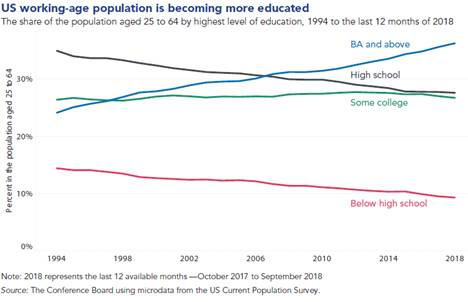
Growing Blue-Collar Labor Shortage
Converging demographic, educational and economic trends have reversed a decades-long trend in the U.S. jobs market, according to a new analysis from the Conference Board, making it harder for companies to find workers in blue-collar and low-paying service occupations than in highly educated, white-collar ones.
Demand for blue-collar workers has grown continuously since the 2008 financial crisis. And shortages are expected to grow in transportation, health-care support, manufacturing, agriculture, mining and construction, in part because of the retirement of baby boomers who held many of these jobs.
While this demand increases, the share of working-age Americans with a bachelor’s degree also has grown. (See chart, below.)
Factors that could influence blue-collar labor shortages in coming years include whether companies invest more in automation, reduce education requirements for jobs or find locations with greater availability of blue-collar labor, the Conference Board said.

